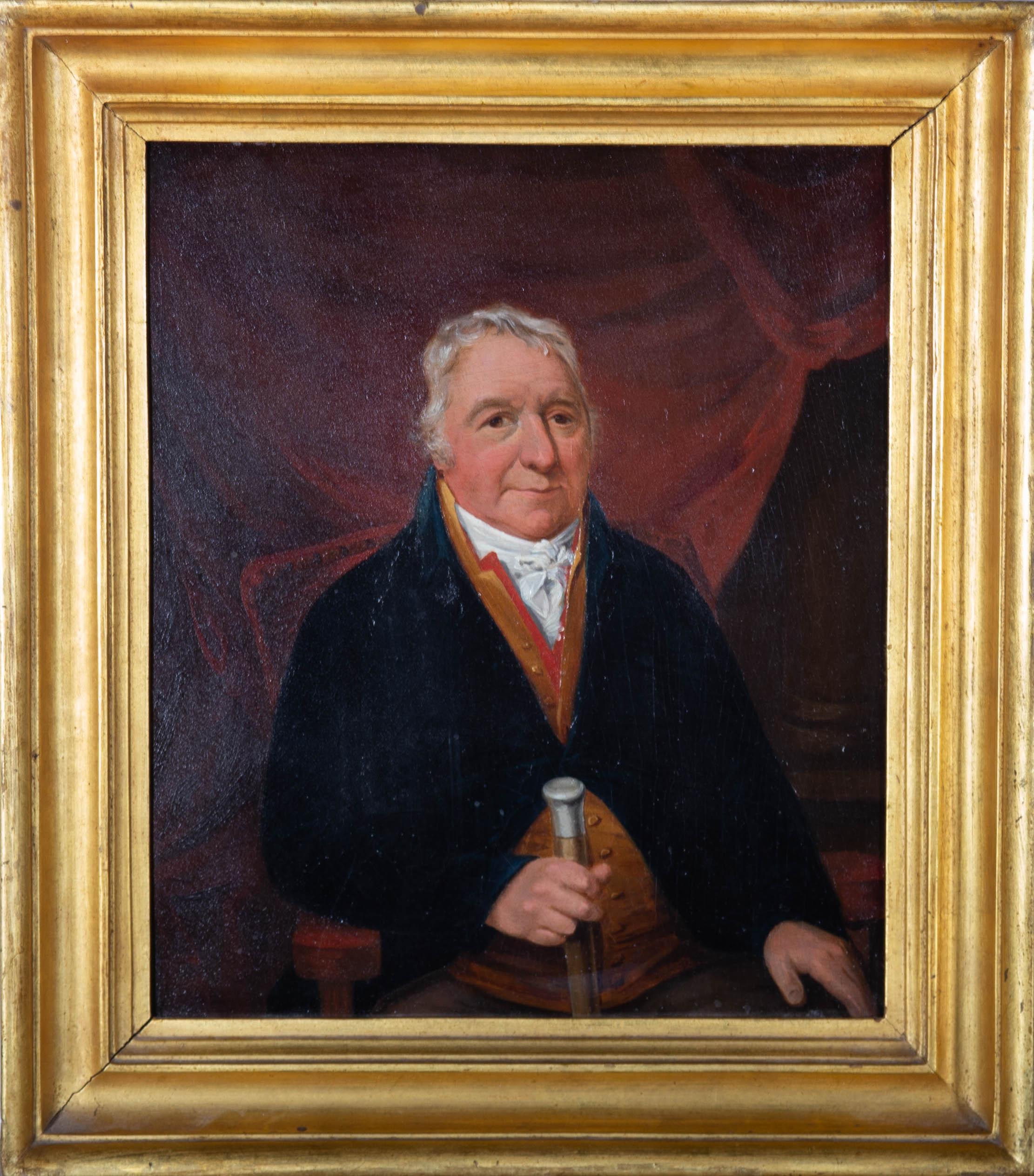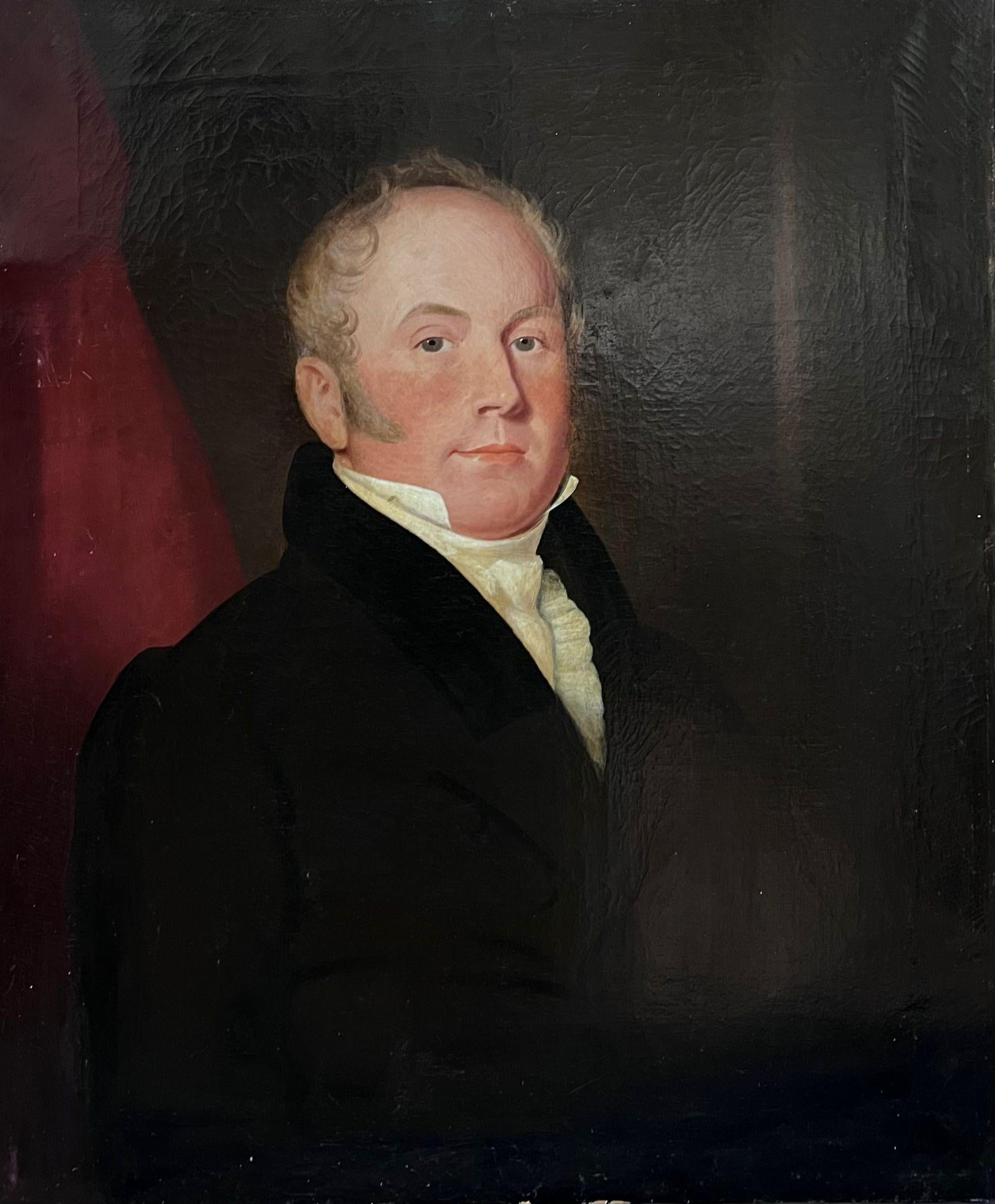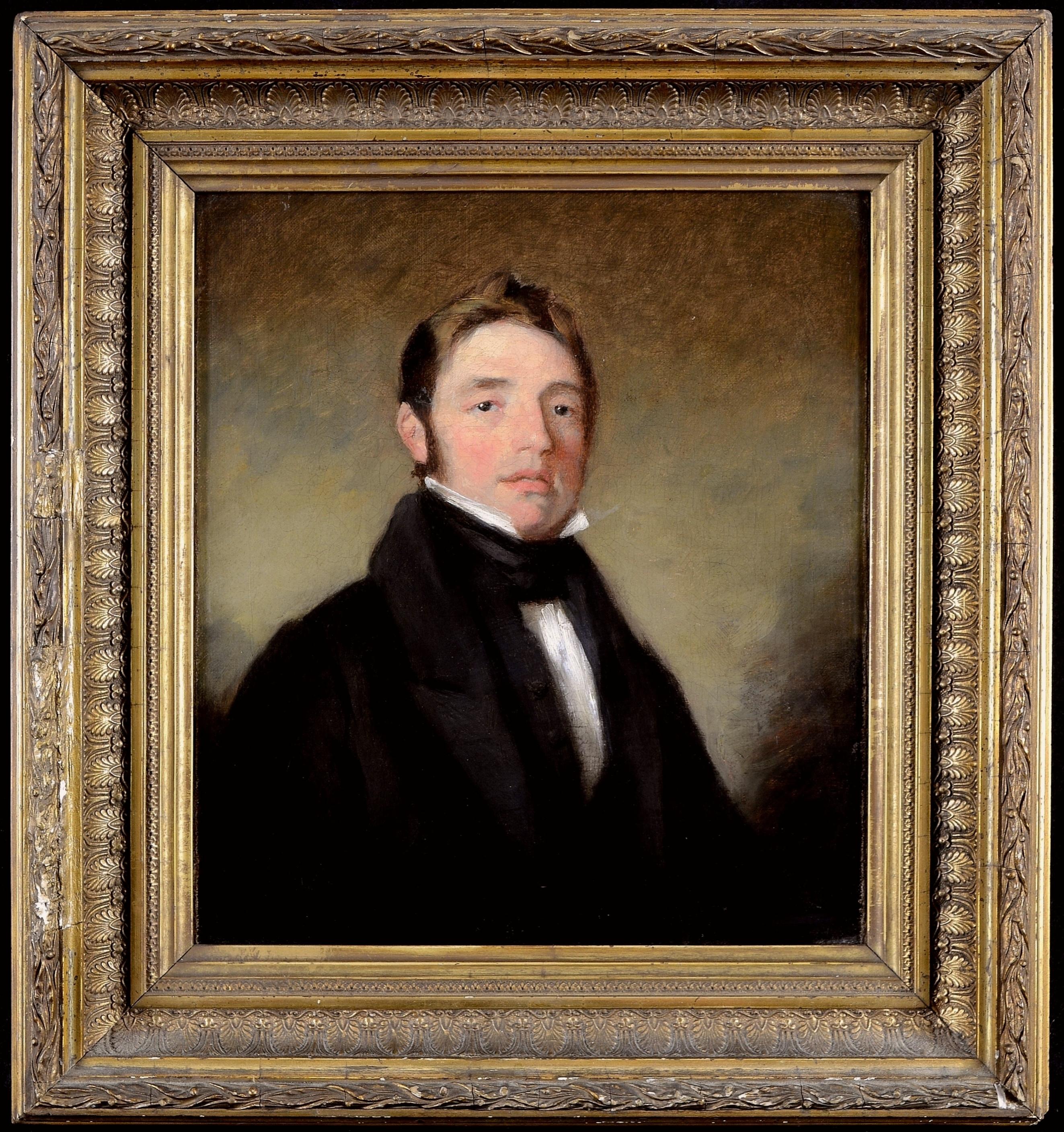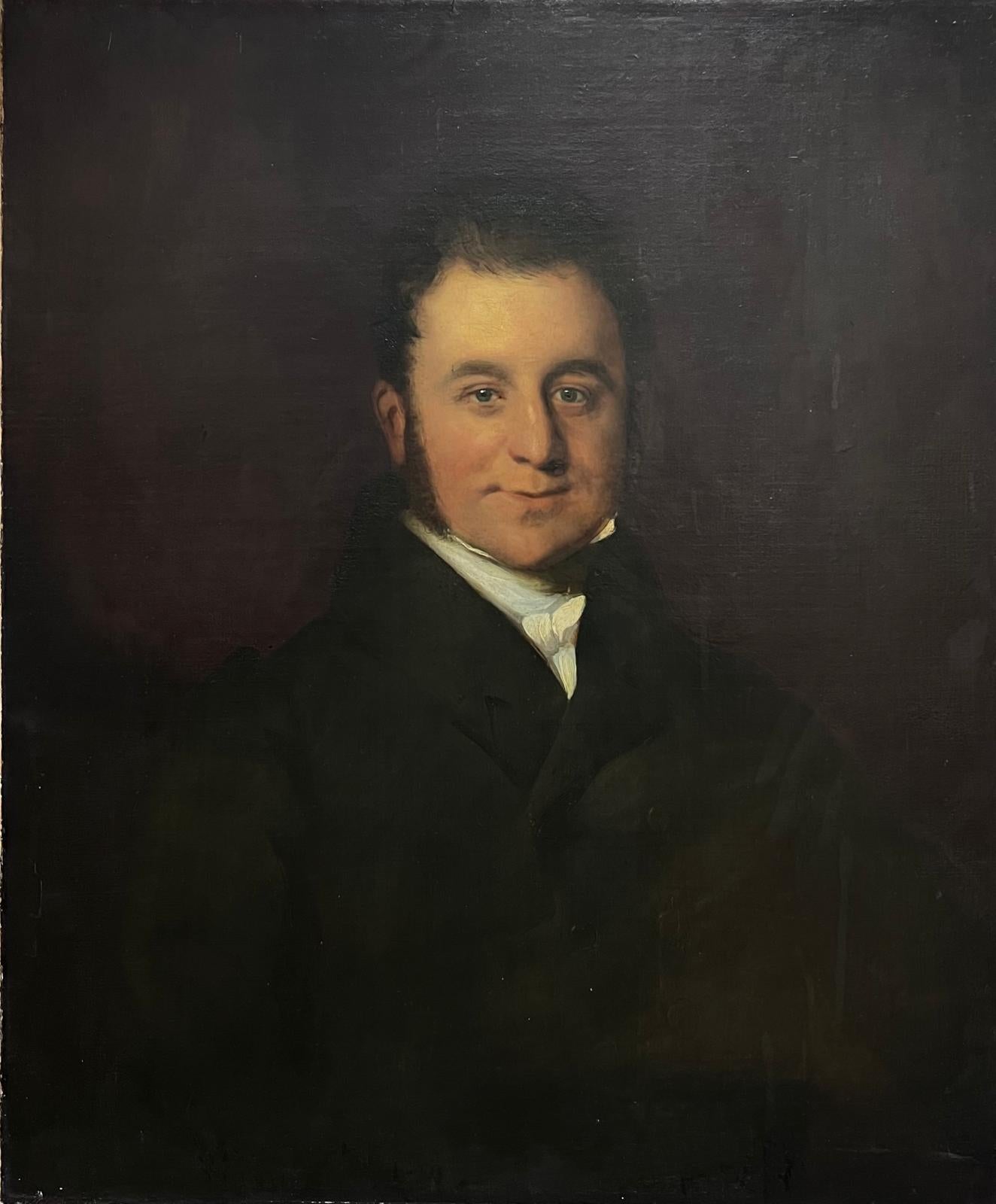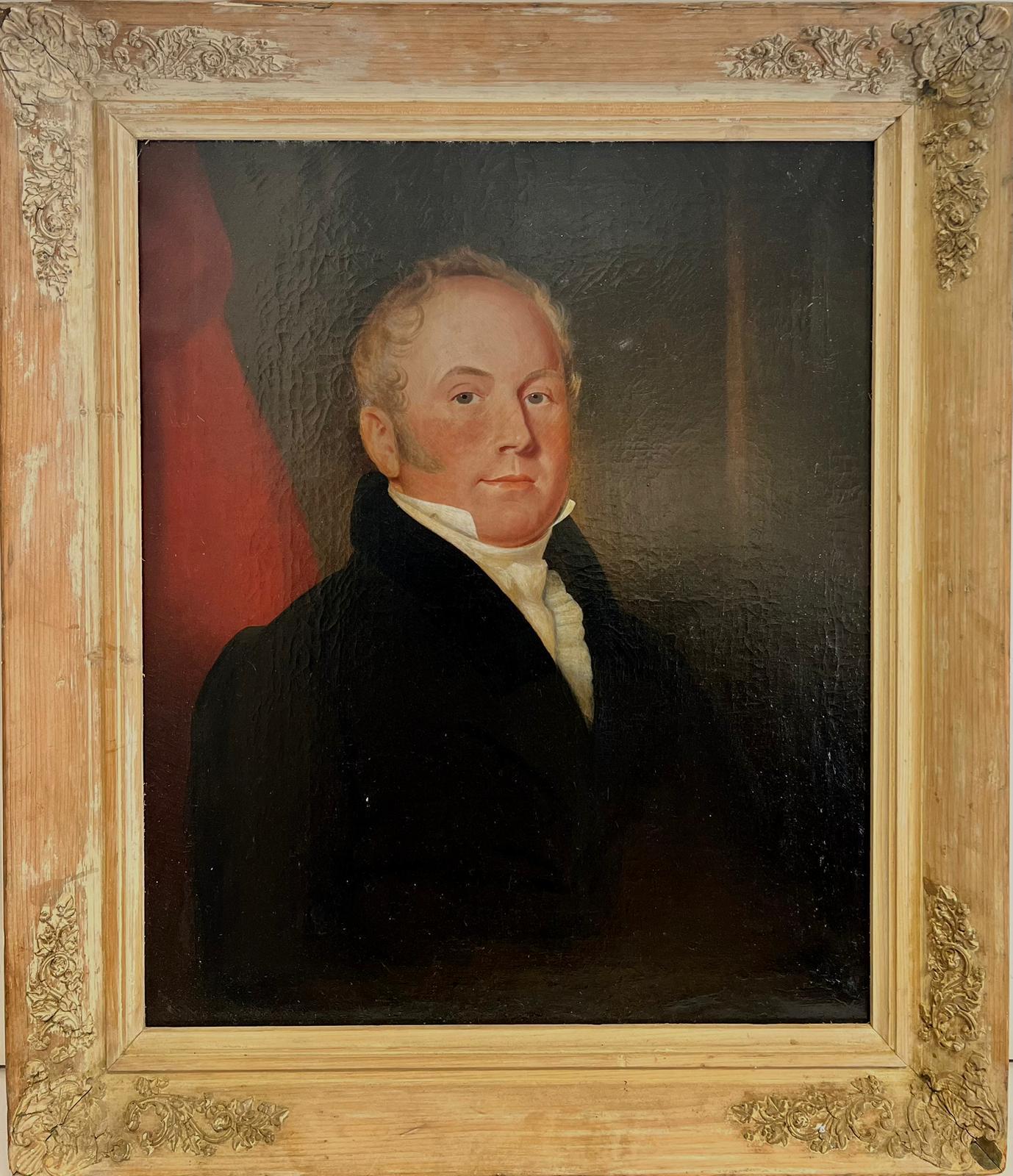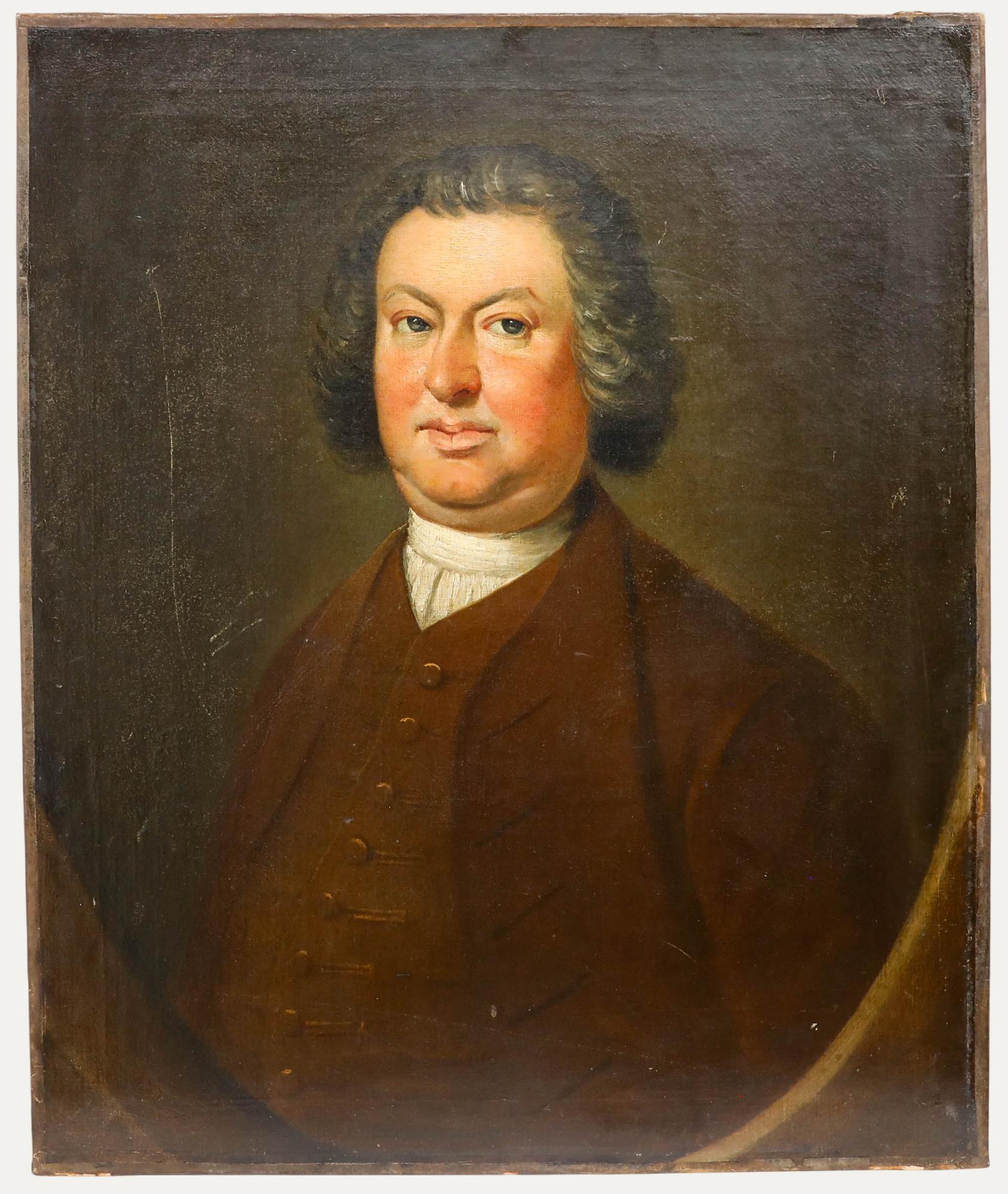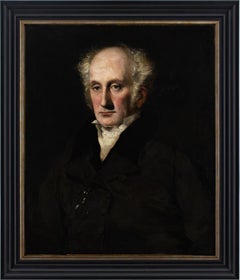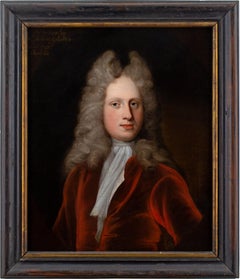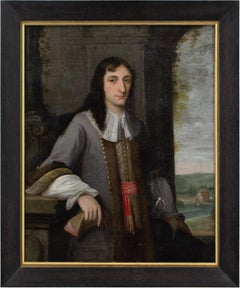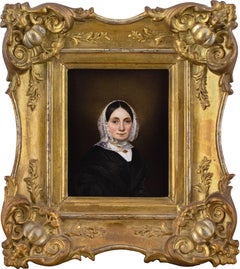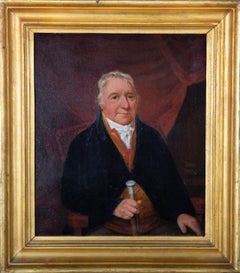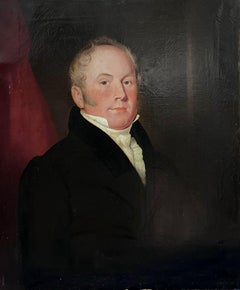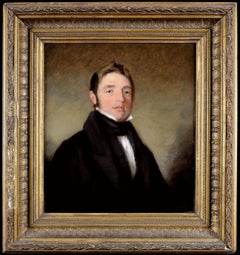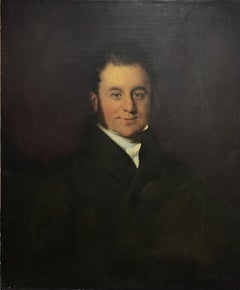Items Similar to Early 19th-Century English School Portrait Of Samuel Jones Of Skeyton, Norfolk
Want more images or videos?
Request additional images or videos from the seller
1 of 13
UnknownEarly 19th-Century English School Portrait Of Samuel Jones Of Skeyton, Norfolkc. 1830
c. 1830
$1,804.45
£1,320
€1,542
CA$2,516.21
A$2,757.41
CHF 1,439.97
MX$33,136.49
NOK 18,002.19
SEK 16,978.93
DKK 11,509.30
About the Item
This fine early 19th-century English oil painting depicts Samuel Jones of Skeyton, Norfolk, smartly attired in a black coat with white cravat. The portrait was previously in the collection of William Sidney Charles Copeman CBE TD FRCP (1900-1970), a medical historian.
Following a thorough search of the ancestry records, it appears that Samuel Jones was born in 1762 to Thomas and Mary of Halvergate, Norfolk, but, following his marriage in 1779 to Deborah Bulwer, raised a family in Skeyton, Norfolk. One of his daughters, Elizabeth Jones (1781-1868) married Edward Breese Copeman, hence the connection to the previous owner William Sidney Charles Copeman. Here, we see him portrayed circa 1830. Little is known of his profession but it seems that he was descended from a farming family.
Unsigned and held in a period frame.
Medium: Oil on canvas
Labels & Inscriptions: Inscribed on the reverse of the frame.
Provenance: Presumably by descent / With William Sidney Charles Copeman CBE TD FRCP.
- Creation Year:c. 1830
- Dimensions:Height: 37 in (93.98 cm)Width: 32 in (81.28 cm)
- Medium:
- Period:
- Condition:Cleaned. Revarnished. Canvas relined. Fine craquelure throughout. The paint layer is stable. Frame with various marks and showing its age.
- Gallery Location:Cheltenham, GB
- Reference Number:1stDibs: LU2328216565122
About the Seller
5.0
Platinum Seller
Premium sellers with a 4.7+ rating and 24-hour response times
Established in 2017
1stDibs seller since 2023
246 sales on 1stDibs
Typical response time: <1 hour
- ShippingRetrieving quote...Shipping from: Cheltenham, United Kingdom
- Return Policy
Authenticity Guarantee
In the unlikely event there’s an issue with an item’s authenticity, contact us within 1 year for a full refund. DetailsMoney-Back Guarantee
If your item is not as described, is damaged in transit, or does not arrive, contact us within 7 days for a full refund. Details24-Hour Cancellation
You have a 24-hour grace period in which to reconsider your purchase, with no questions asked.Vetted Professional Sellers
Our world-class sellers must adhere to strict standards for service and quality, maintaining the integrity of our listings.Price-Match Guarantee
If you find that a seller listed the same item for a lower price elsewhere, we’ll match it.Trusted Global Delivery
Our best-in-class carrier network provides specialized shipping options worldwide, including custom delivery.More From This Seller
View AllJohn Robert Wildman, Portrait Of A Gentleman
Located in Cheltenham, GB
This mid-19th-century oil painting by British artist John Robert Wildman (1788-1843) depicts a gentleman wearing a dark brown frock coat with waistcoat, white shirt and cravat. He be...
Category
1840s Portrait Paintings
Materials
Oil, Canvas
Michael Dahl (Circle), Portrait Of Thomas Stanley
Located in Cheltenham, GB
This early 18th-century English School portrait depicts Thomas Stanley wearing a striking red velvet suit, white cravat and powdered periwig. Fashionable, yet elegantly refined. On t...
Category
Early 18th Century English School Portrait Paintings
Materials
Canvas, Oil
17th-Century Flemish School, Portrait Of A Gentleman In A Justaucorps
Located in Cheltenham, GB
This fine late 17th-century Flemish portrait depicts a distinguished gentleman wearing a justaucorps, black cloak, white shirt, vest, leather gloves, and breeches. He’s carrying a wi...
Category
1670s Old Masters Portrait Paintings
Materials
Oil, Canvas
Mid-19th-Century German School, Portrait Of A Woman
Located in Cheltenham, GB
This fine mid-19th-century German miniature depicts a woman wearing a black dress and a beautiful white and lilac day cap.
Produced around 1840, this exquisite piece on porcelain is...
Category
1840s Victorian Portrait Paintings
Materials
Porcelain
George Clint ARA (Attributed), Portrait Of A Lady In A Brown Dress
Located in Cheltenham, GB
This early 19th-century half-length portrait attributed to British artist George Clint ARA (1770-1854) depicts a young lady wearing a beautiful brown dress, bonnet decorated with small flowers, gold earrings and coral necklace. Clint was a distinguished painter and mezzotint engraver predominantly known for portraiture and dramatic scenes.
Set before an evocative classically-inspired backdrop, she looks out from across the centuries with a composed demeanour. Adorned in the latest fashions, oversized ‘gigot’ sleeves, a delicately-poised bonnet, and a coral necklace for good luck. It’s a charming portrayal by a masterful hand.
Born at Drury Lane, in the heart of London’s West End, George Clint was destined to lead an exuberant life amid the spectacle of theatreland. His father, Michael Clint, was a hairdresser during a time of “hair pomatum, whalebone, wire, lace gauze, and feathers” - so young George would have encountered a variety of ‘characters’ during his childhood.
But despite these elevated surroundings, he soon discovered the darker side of London when thrust into the world of employment. Apprenticed initially as a fishmonger, he trained under a ferocious master who was known to beat him. The hours were unsocial, the conditions rank, and the work was brutal. He soon quit but subsequently found himself toiling for a corrupt attorney who demanded he undertake unscrupulous acts on his behalf.
Seeking a less volatile role, he turned next to house painting, at which he excelled. Commissioned, among other projects, to paint the stones of the arches in the nave of Westminster Abbey. Aside from an incident whereby he almost fell from the second story of a building, all was going well.
Following his marriage in 1792 to Sarah Coxhead, a farmer’s daughter, he began work in earnest as a painter of miniatures, determined to forge a career. Robert William Buss’ memoir celebrates Clint’s success as a miniaturist, stating that “great manual excellence was united with that chaste, delicate feeling for female beauty which characterised all Mr. Clint's portraits of ladies.”
Until this point, it appears he was predominantly self-taught, presumably constrained by a lack of finances. But from hereon in, his industrious nature coupled with several fortunate encounters, led to him developing an enviable talent for both painting and engraving. During the early 19th-century, the acquaintances one kept could make or break your fortunes and perhaps acutely aware of this, Clint’s ‘society’ was an ever-evolving circle of influential personalities.
He was “initiated into the mysteries of engraving” by Edward Bell (act.1794-1819) and produced numerous works after the foremost artists, such as George Stubbs, John Hoppner, and Thomas Lawrence. Following a commission from Lawrence, he struck up a long-term friendship.
Admired for his skill as a mezzotint engraver, he sought next to hone his technique in oils and, as with many aspiring portraitists, his first work in this respect was a depiction of his beloved wife. The pair were both delighted with it, yet over time Clint began to doubt himself and sought the validation of a superior hand - that of Sir William Beechey (1753-1839). However, paralysed with insecurity, he couldn’t face the potential criticism, so his wife took it instead - “with a child under one arm and the portrait in the other”. The result was immeasurably more positive than he’d envisaged and he became closely associated with Beechey until his death in 1839.
Numerous commissions followed from the landed gentry including Lord Egremont, Lord Spencer, and Lord Essex. But also from the theatrical community who would fill his studio at 83 Gower Street, Bloomsbury. His connections within the world of acting led to notable works such as ‘Malvolio and Sir Toby’ (from William Shakespeare's 'Twelfth Night', Act II, Scene iii)’ and ‘Harriet Smithson as Miss Dorillon, in Wives as They Were, and Maids as They Are’.
While his efforts in mezzotint included several contributions to JMW Turner’s Liber Studiorum.
As a measure of his success, Clint was elected an Associate of the Royal Academy in 1821 - a position he later relinquished for personal reasons. Today, he’s represented in numerous public collections including at The British Museum, Harvard Art Museums, The Met, V&A, Yale Center for British Art, and the National Portrait Gallery.
“The respect in which he was held, not only by his brother artists, but by an immense number of eminent men in various professions, and others of the highest rank, was the result of a rare combination of talent, candour, suavity of manner, and integrity of purpose”. [Obituary, 1854].
Housed in a period gilt frame, which is probably original.
Learn more about George Clint ARA in our directory.
Labels & Inscriptions: Supplier’s stencil from Rowney & Forster. The National Portrait Gallery holds a database of supplier’s stencils over the decades. The one here is also presented on two other works by George Clint. ‘Falstaff’s Assignation with Mrs Ford...
Category
1830s English School Portrait Paintings
Materials
Oil, Canvas
Mid-18th-Century German School, Portrait Of An Aristocrat In Armour
Located in Cheltenham, GB
This mid-18th-century half-length German portrait depicts a middle-aged aristocrat wearing armour and a wig.
Despite his heavily-clad appearance, it’s likely that this rather noncha...
Category
1750s Old Masters Portrait Paintings
Materials
Canvas, Oil
You May Also Like
Henry Wyatt (1794-1840) - 1817 Oil, Georgian Gentleman
By Henry Wyatt
Located in Corsham, GB
A truly exquisite example of Georgian portraiture, this characterful painting is in remarkable condition, an overall, beautiful, historical object. The painting, by the renowned Henry Wyatt, shows the sitter (S. S. Lloyd Esquire), in a red high backed chair in front of luxurious red velvet drapery...
Category
Early 19th Century Portrait Paintings
Materials
Oil
$2,476 Sale Price
20% Off
19th Century English Victorian Oil Painting on Canvas Portrait of a Gentleman
Located in Cirencester, Gloucestershire
Portrait of an English Gentleman
English artist, 19th century
oil on canvas, unframed
Canvas: 30.5 x 25 inches
Provenance: Private collection, England
Condition: overall very good an...
Category
19th Century Victorian Portrait Paintings
Materials
Oil, Canvas
Portrait of a Young Gentleman - Early 19th Century English Old Master Painting
Located in Sevenoaks, GB
A fine early 19th century oil on canvas portrait of a young gentleman wearing a white shirt with dark jacket and stock. Presented in an antique gilt frame.
Artist: English School, e...
Category
1820s Portrait Paintings
Materials
Canvas, Oil
1830's British Oil Painting Large Portrait of a Distinguished Gentleman
Located in Cirencester, Gloucestershire
Portrait of an English Gentleman
English School, circa 1830's period
oil on canvas, unframed
Canvas: 30 x 24.5 inches
Provenance: Private collection, UK
Condition: relined canvas, ov...
Category
Early 19th Century English School Portrait Paintings
Materials
Oil, Canvas
Large Victorian Portrait of Country Gentlemen Squire Oil Painting on Canvas
Located in Cirencester, Gloucestershire
English artists, circa 1870
oil painting on canvas, framed
framed: 36 x 31 inches
canvas : 30 x 25 inches
provenance: private collection, England
condition: overall very good and pr...
Category
1870s Victorian Portrait Paintings
Materials
Oil
Early 19th Century Oil - Portrait of George Tomlinson
Located in Corsham, GB
This formal portrait depicts a distinguished gentleman from the early 19th century, rendered in the classical style typical of the period with careful attention to facial features an...
Category
Early 19th Century Portrait Paintings
Materials
Oil
More Ways To Browse
Antique Cravat
19th Century Painting Norfolk
1940s British Portraits
A Hoppner Painting
Aetatis Suae
American Revolution Painting
Battle Of Boyne
Bowler Hat Painting
Boy Painting Male
British Officer Portrait
C Dahl
Charles Beale
Circle Of Peter Lely
Damilola Ilori
Daniele Crespi
David Pryor Adickes
Elisabeth Dujarric De La Riviere
Eric Kennington
